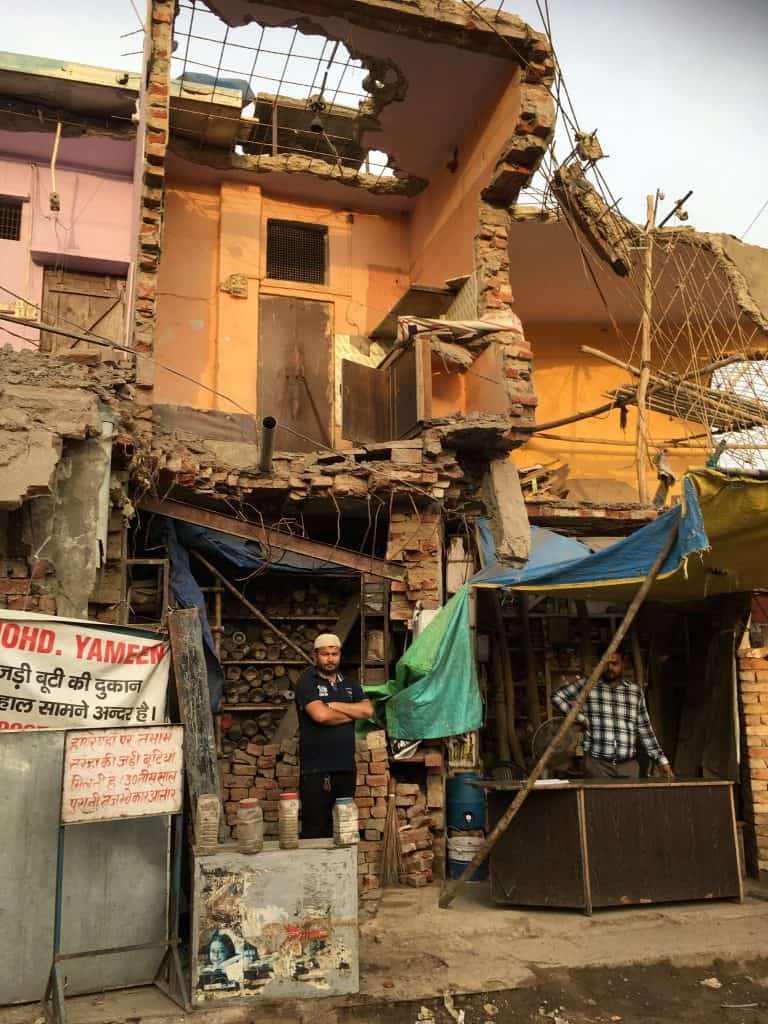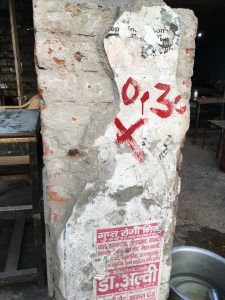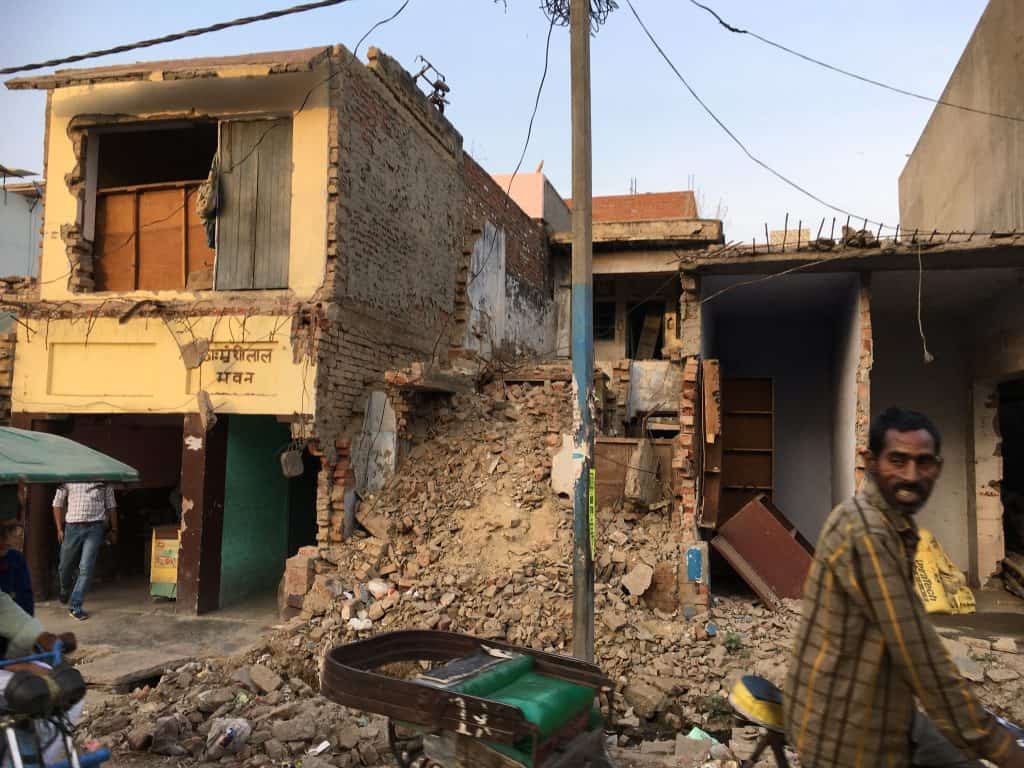Prime Minister Narendra Modi, in his campaign speech in Aligarh on April 14th, invoked three main development indicators, “bijli…kanoon vyavastha…sadak” (electricity, law and order and roads)**.” Development or “vikas” has been one of two constants in his campaign; the other being “karobaar ” or business. In his Aligarh speech, he specifically mentioned how this election was a fight to get “nyay” not only for youth, women and farmers but also for “chote karobaari” or small business owners.
Yet, in Aligarh, vikas and chote karobaari clashed head on when shops belonging to small business owners were demolished to widen roads as part of the Smart Cities Mission.
Rajesh Kumar, 28, used to be the owner of a two-room provisions store that he ran from his home. On new year’s day, he, his wife, and their two young children looked on helplessly as a bulldozer tore down about six metres of their house, including the provision store that was their livelihood. Last month, he had to take a loan from neighbours as he was unable to pay his two-and-a-half year-old-son’s pre-nursery school fees. The bulldozer also destroyed his home’s water pipes. As he cannot afford to replace them, he and his wife carry about 10 buckets of water everyday from their neighbour’s home for their use.
Rajesh Kumar was one of the many victims of the city’s drive against illegal encroachments as part of the Smart Cities Mission, launched in June 2015 by Narendra Modi. The drive was carried out in December-January in the commercial hubs of Centre Point, Samad Road, Marris Road, Medical Road, Dodhpur, and Kelanagar. Aligarh District Magistrate Chandra Bhushan Singh said that it was carried out by the Aligarh Nagar Nigam (ANN) with help from the Aligarh Development Authority (ADA), of which he is Vice-Chairman.

Mohammad Haseem (24) ran a herbal-medicinal store, started by his father in the 1970s. He claims that the landlord is refusing him permission to rebuild his store. With the shop gone, his herbal medicines are exposed to the elements. Besides this, chunks of concrete hang from steel rods and pose a safety risk for him and the general public. Pic: Meher Ali
Smart City plan
Aligarh was included in the third round of the Smart Cities competition in 2017 when it proposed to spend a total of Rs. 2566 crores on smart city projects. District Magistrate Chandra Bhushan Singh said that the administration took a five kilometre radius area as the focus for retrofitting or “planning in existing built-up area”. This included Centre Point and its surrounding industrial areas, Achal Tal, Jama Masjid, and the District Court, which meant that encroachments in these areas were specifically targeted in the anti-encroachment drive.
The total cost of retrofitting this “smart city area” was Rs. 2090 crores. Other “smart city” redevelopment spends included Rs. 207 crore on solid waste management and Rs. 55 crore on solar panels. But as of July 2018, only eight per cent of the city’s faecal sludge was being treated, according to a study conducted by the Centre for Science and Environment, and there were no announcements by the administration on which the company won its bid for the manufacture and supply of solar panels costing six crore rupees.
One key point mentioned in the proposal was “citizen participation”, which included “consultation meetings” with citizens in case of “resistance” to any of these projects. Not only were no such meetings held, ANN officials refused to even show the plan, on the basis of which they were carrying out the demolitions, to the shopkeepers, said Rashid Ali (58), head of the Dodhpur Shopkeepers Union. He got a shopkeeper to covertly take a photo of the plan. “Kachcha naksha tha (It was a rough map),” he said. It was drawn by hand with hand written names of shops and markets, along with measurements that indicated the desired width of Medical Road where these shops were located.

The rough plan that was used to demolish shops and homes on Medical Road, all the way to Dodhpur crossroads. The hand is part of the photo, which was taken covertly.
The administration also did not inform all shopkeepers about the demolitions. While shopkeepers at Centre Point said they were given 15 days’ notice, those in Dodhpur and Medical Road said that red crosses and measurements were put up on their walls the night before the demolition. However, the District Magistrate denied this, saying announcements were made and that the red crosses were indication enough: “Yahi ek alert hai unke liye (This should have alerted them.)”
But what if people were alert and wanted to get the demolition over with so that they could start rebuilding? Like Opesh Agarwal 45. Being his ancestral home, Opesh wanted to avoid the bulldozer clawing away a larger chunk of his home than specified and hired labourers to do the job.

Nagar Nigam workers marked shops and homes with this red cross. The measurement next to it indicates the extent to which it was to be demolished. In some cases, there was just a red cross, which, shopkeepers claim, meant that the building would not be demolished and was “safe”. However, in many cases, even these safe buildings were not excluded. Pic: Meher Ali
But the local government would not allow him to do so as they did not have the final measurements. He was told by a senior government official to stop the demolition as there was a possibility that more of his building would need to go. Agarwal then went on a 24-hour hunger strike to protest the lack of proper planning by the authorities, demanding that the administration give him a final figure of how much he had to break, instead of telling him piecemeal.
He ended his strike after the same official told him that the order to stop Agarwal’s demolition had “come from above.” .Now, there is another red cross on his home, put up in mid-January, which reads “0.8 metres,” Opesh said.
Where is the compensation?
The ANN and the ADA have yet to assess the economic impact of this anti-encroachment drive, but those affected estimate that they have lost a minimum of Rs 2-5 lakh in the demolition and that it would cost them Rs 15-25 lakh to rebuild. Given that over 100 shops and homes were partially or completely demolished, the total loss suffered by the people affected would be a minimum of Rs 2 crore. The estimated cost of rebuilding is around Rs 15 crore.
Rashid Ali filed a Right to Information application 20 days ago to get a copy of the roughly drawn map. He wants to prove that the municipal corporation took more land than it was meant to. For instance, one of his shops was on a road which the government wanted to be 11 metres wide. This meant 5.5 metres needed to be demolished on either side, instead they took six metres from Rashid Ali’s side of the road.
When asked whether people can expect compensation, the District Magistrate said: “Hamaari zameen pe kabza hai aur apni zameen khaali karaane ka kis baat ka compensation? (It is our land that has been encroached, so why should we pay compensation to get it back?)” He, however, added that if anyone did seek compensation, it would be up to the government to decide.
Cost issues
Four months on, many shopkeepers are wary of rebuilding their shops as they fear another demolition. Instead they are waiting till after the elections, when, says shopkeeper Arun Kumar Gupta (54), there is a possibility of new norms being introduced. Others simply do not have the funds to rebuild.
This means that shops and homes are as the bulldozers left them, with steel rods jutting out and chunks of concrete hanging in between, creating an unsafe living environment. The rubble from the demolition also remains piled up near the partly demolished shops.
Opesh Agarwal says that though he supports the local government’s efforts, there was a “timing problem.” The demolitions happened during the holiday season, a crucial time for small businesses that had to shut down but also because the annual Aligarh Numaish, which brings entertainment, artisanal crafts, and food from different parts of Uttar Pradesh to Aligarh, was right around the corner (scheduled for January 20 – Feb 9).
Also, with Aligarh voting on April 18th, both clean-up and rebuilding slowed down and then completely stopped to prepare for the Prime Minister’s campaign visit in early April. Not only did none of the three candidates, Satish Kumar Gautam from BJP, Ajeet Baliyan from BSP and Bijendra Singh Chaudhary from the Congress raise the issue of the January demolitions in their election campaign, they did not even visit the Dodhpur market, which was one of the hardest hit during the demolition, said Rashid Ali. And even a week after polling got over, rubble continues to lie on the roadside and gutters remain uncovered, filling up with garbage and infested with mosquitoes.

Rubble from demolished buildings has yet to be cleared up. The elections have further delayed clean up. Pic: Meher Ali
The haphazard demolition has led to shopkeepers like Dharmendra Kumar (32) losing business as customers avoid shops like his due to the dust and rubble. “Naye ghar mein har koi aata hai, toote huye ghar mein koi nahi aata,” he says. (Everyone comes to a new home, but no one comes to a broken house).
Besides not clearing the rubble, in some areas, a 4-feet-high steel grill has been installed by the local government right in front of shop entrances. Like that of Azam Ali (23) who said there has been a 40 per cent decline in his income since the demolition. Before the demolition, Ali maximised use of space in his small store by using the rear to store biscuits, snacks, and basic provisions and setting up a small counter outside for customers.
When the encroachment drive cut his shop by 4 feet, space became even more cramped. When this reporter visited him, his shop was about 7 feet by 3 feet wide. But the newly- installed grill prevents him from setting up his counter outside. So he has switched from selling provisions to selling cold drinks, paan and bidi. As I take his leave, he says, “Aadhe-aadhe haath kaat diye dukaandaron ke in logon ne (these people have cut the shopkeepers’ hands in half.”
** Errata: This sentence has been changed since first publication to correct an error.
We appreciate the sincere effort of the writer, Ms. Meher Ali, who brought up the issues that has severely affected the common men and their livelihood. This is another hastily taken decision of Modi Sarkar, like demonetization.